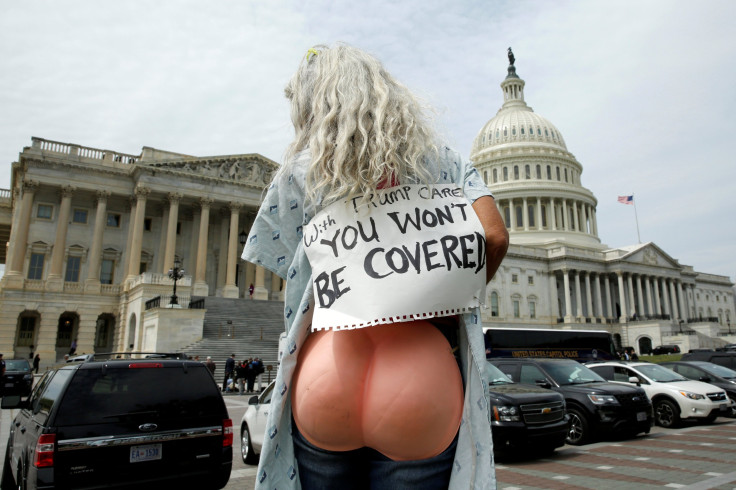Health Care Fight: Republicans Defend Obamacare Replacement, Say Medicaid, Sick Won't Be Hurt [VIDEO]

Republican lawmakers and administration officials defended the House-passed health care bill Sunday, insisting people with pre-existing conditions will be covered and despite $880 billion in cuts in Medicaid, the poor will have better care.
Republican Ohio Gov. John Kasich disagreed, saying he fears what would happen if the measure became law.
The House voted 217-213 Thursday to approve the American Health Care Act to repeal and replace the Affordable Care Act, aka Obamacare, something Republicans have been promising since former President Barack Obama’s signature legislative achievement was signed into law in 2010. The bill was approved before the Congressional Budget Office had a chance to evaluate costs or determine how many people likely would be shut out of the market.
Read: Vice President Mike Pence Admits Reducing Rates Will Swell Budget Hole
The bill now goes to the Senate where it is expected to be rewritten.
Supporters of the House measure argued though Obamacare enabled people to buy insurance, the deductibles actually put health care out of reach and the fact that carriers were pulling out of the state exchanges, many were left with no providers.
Read: What Makes For Monogamy And Good Parenting? It's All In The Genes
Health and Human Services Secretary said on both NBC’s “Meet the Press” and CNN’s “State of the Union” denied people will lose coverage under the House measure, rather, it will allow people to pick the kind of coverage they want rather than having to buy what the federal government tells them to buy.
“Well what I believe [opponents are] not recognizing is that this is a different and we believe a better way to cover individual with pre-existing illnesses and injuries because it allows for every single person to get the access to the kind of coverage that they want. Look, nobody wants folks who have a pre-existing illness or injury not to be covered,” Price said.
“We want to make certain that we can do it at a lower price and broader choices for patients. So that again they’re able to see the doctor that they want to see. They’re able to go to the hospital that they want to go to, and to the clinic that they want to go to, not that Washington forces them to participate in. So this is a, yes, it's a different way. But it's a way that we believe to be better and more comprehensive.”
Price denied the Republican measure would raise costs for the sickest Americans.
“The fact of the matter is that if those individuals who are sicker, who are older, who are poorer, they will get larger subsidies so that they're able to gain the kind of coverage that they need and want for themselves and for their family. Our desire is to make certain that we have a system that works for patients, not for government, not for insurance companies, but for patients. That's the goal,” he said.
On ABC’s “This Week,” House Speaker Paul Ryan, R-Wis., called the House-approved measure a “rescue mission to make sure that we can achieve the goals we all want, which is getting the cost of coverage down and making sure that everyone has access to affordable health care, especially and including people with pre-existing conditions” but sidestepped the question of whether it would have a negative impact on anyone.
http://abcnews.go.com/
">ABC Breaking News | http://abcnews.go.com/Video">Latest News Videos
“The system is failing. We're stepping in front of it and rescuing people from a collapsing system,” Ryan said.
White House budget chief Mick Mulvaney pledged on CBS’ “Face the Nation” the Republican effort will provide coverage for “everybody … and it’s better than Obamacare.”
“I’m concerned about how this is going to affect people who find themselves in a very difficult position,” Kasich said on CNN’s “State of the Union.”
Kasich called the bill woefully inadequate and disappointing given that millions of people will be kicked off Medicaid after 2020.
“How do we think that the mentally ill have the ability to pay the deductible on an insurance policy?” Kasich asked, adding he hopes the Senate will “write a much bigger bill.”
Sen. Susan Collins, R-Maine, declared the House bill dead on arrival in the Senate.
“Well, first of all, the House bill is not going to come before us. The Senate is starting from scratch. We're going to draft our own bill,” she said on “This Week.”
Though she is not part of the working group put together by the Senate leadership, Collins said she is working with other lawmakers to craft a bipartisan measure.
“If we're going reduce the cost of health insurance, we have to take steps to reduce the costs of health care. And no one's talking about that,” Collins said, adding that people need to know the actual costs of their care so they can make intelligent decisions.
Kasich said the key to controlling health care costs is giving states the ability to negotiate drug prices and give states the ability to exclude costly medicines.
Sen. Roy Blunt, R-Mo., said on “This Week” the goal of the Republican effort “should be to include people in the system who aren’t in it yet, to give people more choices, to create more competition.”
“Coverage is different than access. And both in the insurance market where a lot of people have coverage but nobody has a place to go because their deductible’s so high, or in Medicaid where people are covered but doctors increasingly don’t want to take Medicaid patients. Those are the kind of problems we ought to be solving,” Blunt said.
© Copyright IBTimes 2025. All rights reserved.






















